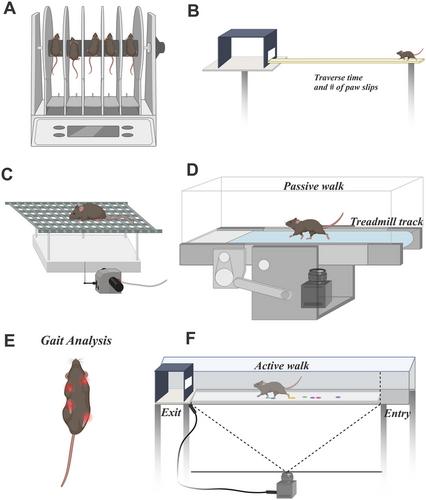下载PDF
{"title":"Behavioral Assays for Comprehensive Evaluation of Cognitive and Neuropsychiatric Comorbidities of Traumatic Brain Injury and Chronic Neurological Disorders","authors":"Doodipala Samba Reddy, Yue Li, Taha Qamari, Sreevidhya Ramakrishnan","doi":"10.1002/cpz1.70019","DOIUrl":null,"url":null,"abstract":"<p>Neurological deficits, psychiatric disorders, and cognitive impairments often accompany stroke, brain injury, epilepsy, and many neurological disorders, which present intricate comorbidities that challenge recognition and management. There are many tools and paradigms for evaluating learning, memory, anxiety, and depression-like behaviors in lab animal models of brain disorders. However, there is a significant gap between clinical observations and experimental models, which limit understanding of the complex interplay between chronic brain conditions and their impact on cognitive dysfunction and psychiatric impairments. This article describes an overview of experimental rationale, methods, protocols, and strategies for evaluating sensorimotor, affective and cognitive-associated comorbid behaviors in epilepsy, traumatic brain injury (TBI), stroke, spinal cord injury (SCI), and many other neurological disorders. First, we delve into clinical evidence elucidating the profound impact of comorbidities, e.g., psychiatric disorders and cognitive deficits, in individuals with epilepsy. Then, we discuss diverse approaches to assess these comorbidities in experimental models of brain diseases. Finally, we explore the methodologies for assessing motor function, sensorimotor, behavior, and psychiatric health. We cover strategies and protocols enabling these assays, including implementing behavioral paradigms to assess learning and memory, anxiety, and depression-like behaviors in rodents in health and disease conditions. It is essential to consider a comprehensive battery of tests to investigate various behavioral deficits, considering environment, age, and sex differences relevant to the disease, such as TBI, SCI, epilepsy, stroke, and other complex neurological conditions. © 2024 The Author(s). Current Protocols published by Wiley Periodicals LLC.</p>","PeriodicalId":93970,"journal":{"name":"Current protocols","volume":"4 10","pages":""},"PeriodicalIF":2.2000,"publicationDate":"2024-10-18","publicationTypes":"Journal Article","fieldsOfStudy":null,"isOpenAccess":false,"openAccessPdf":"https://onlinelibrary.wiley.com/doi/epdf/10.1002/cpz1.70019","citationCount":"0","resultStr":null,"platform":"Semanticscholar","paperid":null,"PeriodicalName":"Current protocols","FirstCategoryId":"1085","ListUrlMain":"https://currentprotocols.onlinelibrary.wiley.com/doi/10.1002/cpz1.70019","RegionNum":0,"RegionCategory":null,"ArticlePicture":[],"TitleCN":null,"AbstractTextCN":null,"PMCID":null,"EPubDate":"","PubModel":"","JCR":"","JCRName":"","Score":null,"Total":0}
引用次数: 0
引用
批量引用
Abstract
Neurological deficits, psychiatric disorders, and cognitive impairments often accompany stroke, brain injury, epilepsy, and many neurological disorders, which present intricate comorbidities that challenge recognition and management. There are many tools and paradigms for evaluating learning, memory, anxiety, and depression-like behaviors in lab animal models of brain disorders. However, there is a significant gap between clinical observations and experimental models, which limit understanding of the complex interplay between chronic brain conditions and their impact on cognitive dysfunction and psychiatric impairments. This article describes an overview of experimental rationale, methods, protocols, and strategies for evaluating sensorimotor, affective and cognitive-associated comorbid behaviors in epilepsy, traumatic brain injury (TBI), stroke, spinal cord injury (SCI), and many other neurological disorders. First, we delve into clinical evidence elucidating the profound impact of comorbidities, e.g., psychiatric disorders and cognitive deficits, in individuals with epilepsy. Then, we discuss diverse approaches to assess these comorbidities in experimental models of brain diseases. Finally, we explore the methodologies for assessing motor function, sensorimotor, behavior, and psychiatric health. We cover strategies and protocols enabling these assays, including implementing behavioral paradigms to assess learning and memory, anxiety, and depression-like behaviors in rodents in health and disease conditions. It is essential to consider a comprehensive battery of tests to investigate various behavioral deficits, considering environment, age, and sex differences relevant to the disease, such as TBI, SCI, epilepsy, stroke, and other complex neurological conditions. © 2024 The Author(s). Current Protocols published by Wiley Periodicals LLC.



